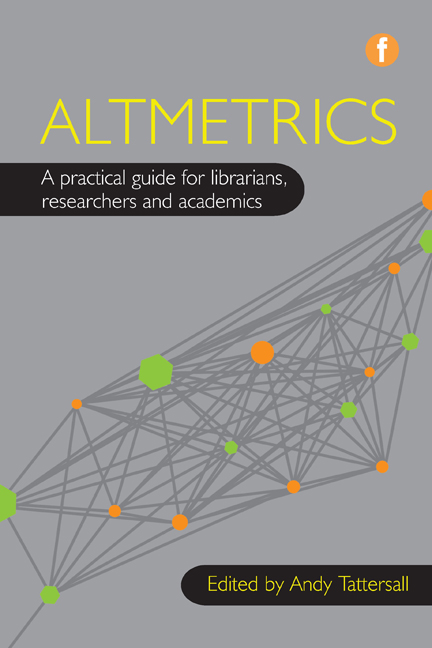Book contents
- Frontmatter
- Contents
- Contributors
- 1 Introduction
- 2 Road map: from Web 2.0 to altmetrics
- 3 ‘Metrics of the trade’: where have we come from?
- 4 The evolution of library metrics
- 5 The rise of altmetrics
- 6 Beyond bibliometrics: altmetrics reflects information about engagement with more types of scholarly content from more types of consumers
- 7 Considerations for implementing new technologies
- 8 Resources and tools
- 9 The connected academic: implementing altmetrics within your organization
- 10 Appmetrics: improving impact on the go
- 11 Open peer review
- 12 Conclusion
- Index
7 - Considerations for implementing new technologies
Published online by Cambridge University Press: 08 June 2018
- Frontmatter
- Contents
- Contributors
- 1 Introduction
- 2 Road map: from Web 2.0 to altmetrics
- 3 ‘Metrics of the trade’: where have we come from?
- 4 The evolution of library metrics
- 5 The rise of altmetrics
- 6 Beyond bibliometrics: altmetrics reflects information about engagement with more types of scholarly content from more types of consumers
- 7 Considerations for implementing new technologies
- 8 Resources and tools
- 9 The connected academic: implementing altmetrics within your organization
- 10 Appmetrics: improving impact on the go
- 11 Open peer review
- 12 Conclusion
- Index
Summary
Introduction
This chapter aims to explain the various issues that need to be considered by researchers when applying new technologies, or by LIS professionals when encouraging researchers to take them up. The growing number of technologies, web, desktop or mobile, adds to the issues relating to their use. The chapter will investigate these issues, which academics and support professionals alike frequently fail to identify. Its pragmatic advice to readers is that, by following a few simple rules, these technologies can be applied with a minimum of fuss for a maximum of impact.
Teachers have a pedagogy; what do researchers employ?
Anyone who is directly involved in any kind of technology-enhanced teaching and support will seek to make good use of the available technologies and will have to make informed judgements as to whether a specific technology will a make useful contribution to their task. Such decisions are led by the pedagogy, that is, the practice of how best to teach. A competent teacher or learning technologist will endeavour to use a technology to enhance their or the lecturer's teaching and the students’ learning experience. By just using technology for its own sake, teachers run the risk of disrupting the learning process and negatively affecting the classroom and its learning objectives. The same can be said in research, because altmetrics and other social and web technologies can be regarded as disrupters. The impact of MOOCs on learning, open access on publishing and big data on research data all show that there are changes afoot within the academic community. These innovations have come to us through technology and have disrupted higher education and research in varying degrees. In the longer term, it would be good to be able to look back and see them as changes for the good, but it is too early to judge just yet. Certainly, many academics would agree that the existing systems of delivering lectures, managing and publishing research needed to be overhauled for the 21st century. So, as the hardware and software become more readily available, it makes sense to explore the possibilities that they present.
- Type
- Chapter
- Information
- AltmetricsA practical guide for librarians, researchers and academics, pp. 99 - 108Publisher: FacetPrint publication year: 2016



